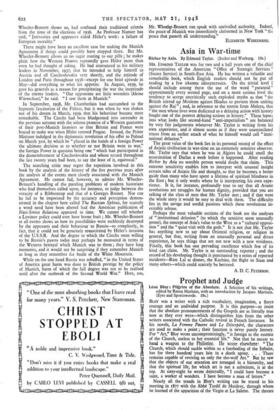Asia in War-time
Richer by Asia. By Edmond Taylor. (Secker and Warburg. 16s.) MR. EDMOND TAYLOR was for two and a half years one of the chief representatives of the American " Office of Strategic Services " (Secret Service) in South-East- Asia. He has written a valuable and remarkable book, which English readers should not be put off reading by a few irksome idiosyncrasies. On the trivial level I should include among these the use of the word " paranoid " approximately every second page, and on a more serious level the tendency to accept uncritically such exploded myths as that " the British stirred up Moslems against Hindus to prevent them uniting against the Raj " ; and, in reference to the retreat from Malaya, that " the men whose lives were dedicated to a delaying action with history fought one of the poorest delaying actions in history." These lapses into what looks like second-hand " anti-imperialism " are balanced by very fair judgements whenever Mr. Taylor is writing from his own experience, and it almost seems as if they were unassimilated traces from an earlier attack of what he himself would call "insti- tutional delusion."
The great value of the book lies in its personal record of the effect of Asiatic civilisation in war-time on an extremely sensitive observer. Mr. Taylor says that when he was in Algiers he could smell the assassination of Darlan a week before it happened. After reading Richer by Asia no sensible person would doubt that claim. This extreme sensitivity enables him to interpret with unusual insight certain sides of Asiatic life and thought, so that he becomes a better guide than many who have spent a lifetime of spiritual blindness in the East ; but it only works where he is interpreting his own expe- rience. It is, for instance, profoundly true to say that all Asiatic revolutions are struggles for human dignity, provided that you are talking of the class of men that Mr. Taylor met ; and if that were the whole story it would be easy to deal with them. The difficulty lies in the savage and sordid passions which these revolutions in- evitably release.
Perhaps the most valuable sections of the book are the analyses of "institutional delusion" (to which the sensitive seem unusually prone), the concept of Asia's value to the West as a " cultural opposi- tion " and the " quiet visit with the gods." It is not that Mr. Taylor has anything new to say about Oriental religion, or religion in general, but that, writing from an unusually personal and direct experience, he says things that are not new with a new vividness. Finally, this book has one pervading excellence which few of its kind can claim. Mr. Taylor is an outstanding reporter ; and the record of his developing thought is punctuated by a series of reported incidents—Ram Lal at dinner, the Kachins, the flight to Siam and many others—which could scarcely be bettered. .
A. D. C. PETERSON.


































 Previous page
Previous page